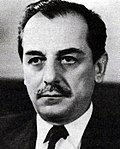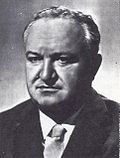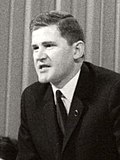 |
|---|
This article lists the deputy heads of state of Yugoslavia from the establishment of the Socialist Federal Republic of Yugoslavia in 1945 until the country's breakup in 1992.
 |
|---|
This article lists the deputy heads of state of Yugoslavia from the establishment of the Socialist Federal Republic of Yugoslavia in 1945 until the country's breakup in 1992.
| No. | Portrait | Name (Birth–Death) | Representing | Term of office | Party | Notes | Refs. | ||
|---|---|---|---|---|---|---|---|---|---|
| Took office | Left office | Time in office | |||||||
| Vice Presidents of the Presidency of the National Assembly 1946–1953 | |||||||||
| N/A |  | Moša Pijade Моша Пијаде (1890–1957) | SR Serbia | 1946 | 1953 | 6–7 years | Communist Party of Yugoslavia | Communist Party of Yugoslavia (KPJ) reformed and renamed League of Communists of Yugoslavia (SKJ) in 1952. | — |
 | Josip Rus Јосип Рус (1893–1985) | SR Slovenia | |||||||
 | Dimitar Vlahov Димитар Влахов (1878–1953) | SR Macedonia | |||||||
 | Filip Lakuš Филип Лакуш (1888–1958) | SR Croatia | |||||||
 | Đuro Pucar Ђуро Пуцар (1899–1979) | SR Bosnia and Herzegovina | |||||||
 | Marko Vujačić Марко Вујачић (1889–1974) | SR Montenegro | |||||||
| Vice Presidents 1963–1967 | |||||||||
| 1 |  | Aleksandar Ranković Александар Ранковић (1909–1983) | SR Serbia | 1963 | 1 July 1966 | 2–3 years | League of Communists of Yugoslavia | [1] | |
| 2 |  | Koča Popović Коча Поповић (1908–1992) | SR Serbia | 14 July 1966 | 1967 | 1 year | League of Communists of Yugoslavia | [2] | |
| Vice Presidents of the Presidency 1971–1991 | |||||||||
| 1 (3) |  | Krste Crvenkovski Крсте Црвенковски (1921–2001) | SR Macedonia | 1971 | 1972 | 1 year | League of Communists of Yugoslavia | [3] | |
| 2 (4) |  | Ratomir Dugonjić Ратомир Дугоњић (1916–1987) | SR Bosnia and Herzegovina | 1972 | 1973 | 1 year | League of Communists of Yugoslavia | [3] | |
| 3 (5) |  | Mitja Ribičič Митја Рибичич (1919–2013) | SR Slovenia | 1973 | 1974 | 1 year | League of Communists of Yugoslavia | [3] | |
| 4 (6) |  | Petar Stambolić Петар Стамболић (1912–2007) | SR Serbia | July 1974 | July 1975 | 1 year | League of Communists of Yugoslavia | First tenure. | [4] |
| 5 (7) |  | Vladimir Bakarić Владимир Бакарић (1912–1983) | SR Croatia | 1975 | 1976 | 1 year | League of Communists of Yugoslavia | First tenure. | — |
| 6 (8) |  | Vidoje Žarković Видоје Жарковић (1927–2000) | SR Montenegro | 1976 | 1977 | 1 year | League of Communists of Yugoslavia | First tenure. | — |
| 7 (9) |  | Stevan Doronjski Стеван Дороњски (1919–1981) | SAP Vojvodina | 1977 | 15 May 1978 | 1 year | League of Communists of Yugoslavia | — | |
| 8 (10) |  | Fadil Hoxha Фадиљ Хоџа (1916–2001) | SAP Kosovo | 15 May 1978 | 15 May 1979 | 1 year | League of Communists of Yugoslavia | [5] | |
| 9 (11) |  | Lazar Koliševski Лазар Колишевски (1914–2000) | SR Macedonia | 15 May 1979 | 4 May 1980 | 355 days | League of Communists of Yugoslavia | — | |
| 10 (12) |  | Cvijetin Mijatović Цвијетин Мијатовић (1913–1999) | Bosnia and Herzegovina | 4 May 1980 | 15 May 1980 | 11 days | League of Communists of Yugoslavia | [6] | |
| 11 (13) |  | Sergej Kraigher Сергеј Крајгер (1914–2001) | SR Slovenia | 15 May 1980 | 15 May 1981 | 1 year | League of Communists of Yugoslavia | [7] | |
| (4) (6) |  | Petar Stambolić Петар Стамболић (1912–2007) | SR Serbia | 15 May 1981 | 15 May 1982 | 1 year | League of Communists of Yugoslavia | Second tenure. | [7] |
| (5) (7) |  | Vladimir Bakarić Владимир Бакарић (1912–1983) | SR Croatia | 15 May 1982 | 16 January 1983 | 236 days | League of Communists of Yugoslavia | Second tenure. Died in office. | [8] |
| 12 (14) |  | Mika Špiljak Мика Шпиљак (1916–2007) | SR Croatia | January 1983 | 15 May 1983 | 4 months | League of Communists of Yugoslavia | [9] | |
| (6) (8) |  | Vidoje Žarković Видоје Жарковић (1927–2000) | SR Montenegro | 15 May 1983 | 15 May 1984 | 1 year | League of Communists of Yugoslavia | Second tenure. | — |
| 13 (15) |  | Radovan Vlajković Радован Влајковић (1924–2001) | SAP Vojvodina | 15 May 1984 | 15 May 1985 | 1 year | League of Communists of Yugoslavia | — | |
| 14 (16) |  | Sinan Hasani Синан Хасани (1922–2010) | SAP Kosovo | 15 May 1985 | 15 May 1986 | 1 year | League of Communists of Yugoslavia | — | |
| 15 (17) |  | Lazar Mojsov Лазар Мојсов (1920–2011) | SR Macedonia | 15 May 1986 | 15 May 1987 | 1 year | League of Communists of Yugoslavia | [10] | |
| 16 (18) |  | Hamdija Pozderac Хамдија Поздерац (1924–1988) | SR Bosnia and Herzegovina | 15 May 1987 | September 1987 | 3 months | League of Communists of Yugoslavia | — | |
| 17 (19) |  | Raif Dizdarević Раиф Диздаревић (born 1926) | SR Bosnia and Herzegovina | September 1987 | 15 May 1988 | 8 months | League of Communists of Yugoslavia | — | |
| 18 (20) |  | Stane Dolanc Стане Доланц (1925–1999) | SR Slovenia | 15 May 1988 | 15 May 1989 | 1 year | League of Communists of Yugoslavia | [11] | |
| 19 (21) |  | Borisav Jović Борислав Јовић (1928–2021) | SR Serbia | 15 May 1989 | 15 May 1990 | 1 year | League of Communists of Yugoslavia | — | |
| 20 (22) |  | Stipe Šuvar Стипе Шувар (1936–2004) | R Croatia | 15 May 1990 | August 1990 | 2 months | League of Communists of Yugoslavia | Dismissed by the Croatian Parliament. | — |
| 21 (23) |  | Stjepan Mesić Стјепан Месић (born 1934) | R Croatia | August 1990 | 15 May 1991 | 9 months | Croatian Democratic Union | — | |
| 22 (24) |  | Branko Kostić Бранко Костић (1939–2020) | SR Montenegro | 15 May 1991 | December 1991 | 6 months | Democratic Party of Socialists of Montenegro | — | |
